Snapshot 1866 – Slavery: A Wound on the Soul of a Nation…
August 25, 2025 by GuyHeilenman · 1 Comment
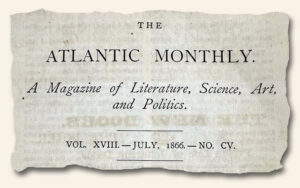 Few institutions in human history have inflicted more suffering or revealed deeper moral failings than slavery. Its cruelty was evident to many, even in its own time, and voices of conscience spoke out with clarity and passion against it.
Few institutions in human history have inflicted more suffering or revealed deeper moral failings than slavery. Its cruelty was evident to many, even in its own time, and voices of conscience spoke out with clarity and passion against it.
Frederick Douglass exposed the hypocrisy of those who justified such inhumanity in the name of religion:
“The man who wields the blood-clotted cowskin during the week fills the pulpit on Sunday, and claims to be a minister of the meek and lowly Jesus.”
Abraham Lincoln, never one to shy away from blunt truths, offered this biting reflection:
“Whenever I hear anyone arguing for slavery, I feel a strong impulse to see it tried on him personally.”
William Lloyd Garrison cut to the heart of the injustice:
“The slave is doomed to toil, that others may reap the fruits.”
And Harriet Tubman, who risked everything to lead others to freedom, distilled its evil to its core:
“Slavery is theft — theft of a life, theft of work, theft of any opportunity to shape one’s own destiny.”
While President Lincoln’s Emancipation Proclamation, issued on January 1, 1863, marked a turning point, the road to slavery’s demise was long, brutal, and soaked in the blood of those who fought to end it. The institution did not go quietly—it clung on with all its bitter force until finally it was defeated, leaving behind a scar but also a renewed hope for the American promise.
This complex and painful chapter was not lost on poet William Cullen Bryant. In 1866, just a year after the Civil War’s end, he shared his reflections in a powerful poem published in the July issue of The Atlantic Monthly. That poem, in its entirety, is presented below—a poignant reminder of what was endured, and what was overcome.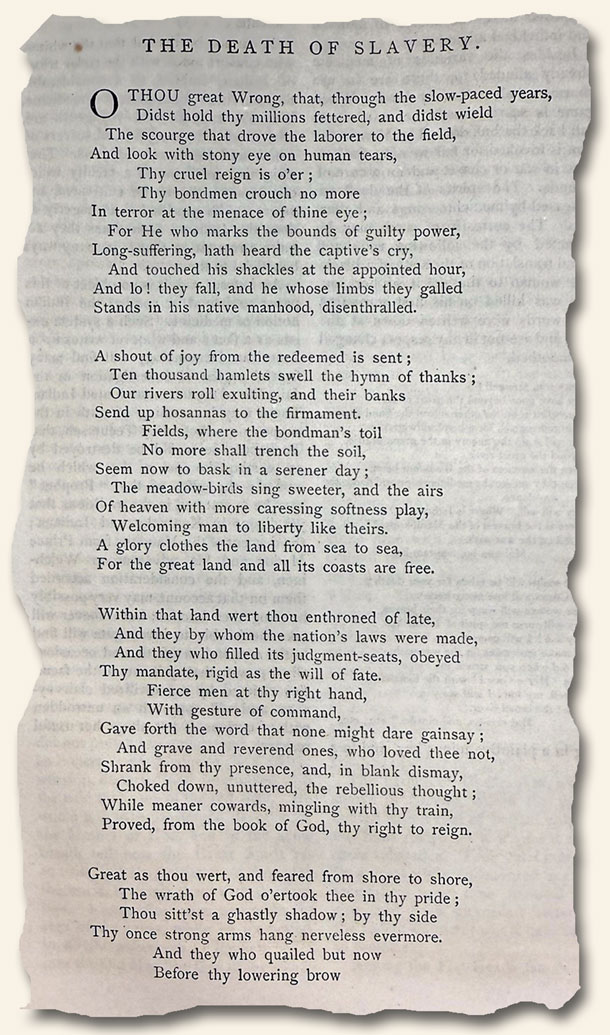
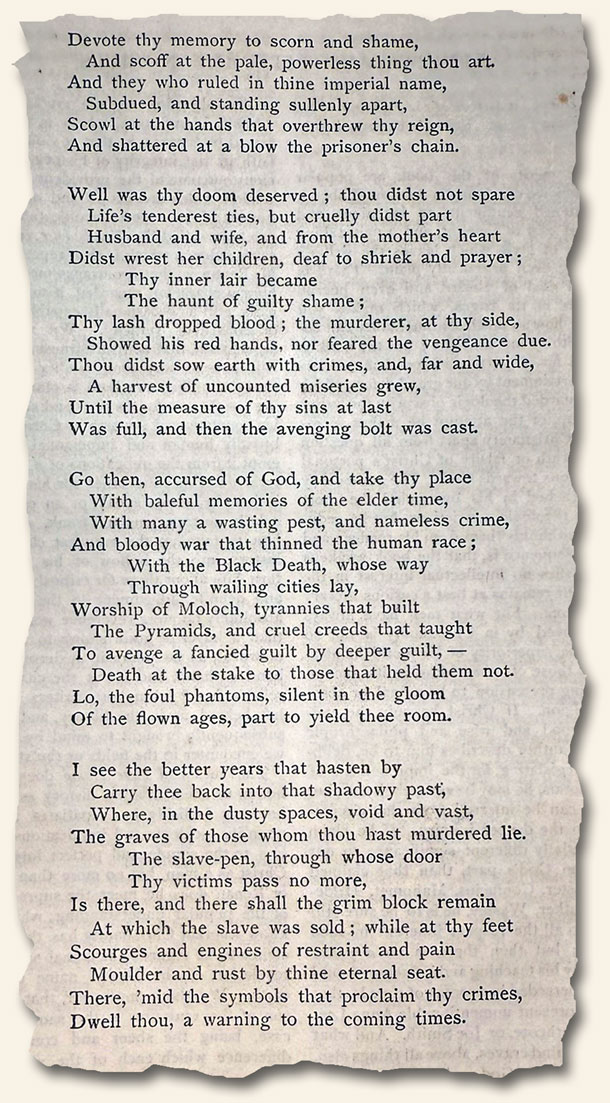
The reason I collected it: an “association piece” attached…
June 23, 2025 by TimHughes · Leave a Comment
 Occasionally there are items that accompany a newspaper that add a bit of “flavor” to the issue, like a subscription receipt to the newspaper, or a glued subscription label of the subscriber, and occasionally a newspaper that was sent through the postal system with the postage stamp still attached. “The Manchester Guardian” newspaper from England dated July 5, 1861, by itself is inconsequential to history (i.e., it does not appear to contain any historical reports), however, it has an attachment that is rarely found on the front page. In fact, this is the first of this sort we have seen.
Occasionally there are items that accompany a newspaper that add a bit of “flavor” to the issue, like a subscription receipt to the newspaper, or a glued subscription label of the subscriber, and occasionally a newspaper that was sent through the postal system with the postage stamp still attached. “The Manchester Guardian” newspaper from England dated July 5, 1861, by itself is inconsequential to history (i.e., it does not appear to contain any historical reports), however, it has an attachment that is rarely found on the front page. In fact, this is the first of this sort we have seen.
Printed on orange paper is a large label headed: “Newspaper Despatch Only. From Liverpool Agency of New York Associated Press…” noting that this newspaper was sent by the steamship “Asia” and that it: “Sailed July 6, 1861” bound for the “HERALD NEW YORK”.
Given this was before the Atlantic telegraph was fully successful, the only way for news to be exchanged across the ocean was by ship. It is possible the Guardian and the Herald had a reciprocal exchange subscription operated by the Associated Press, which was founded 15 years earlier.
Rare to find such an associated attachment and a nice issue to hang on to when found.
Discovery: Under the theme “Golden Nuggets”… After all of the years this has been in-hand, it was just discovered that the back page contains a report on the death of the renowned poet, Elizabeth Barrett Browning. Fun!
Our History Unites Us – Celebrating Paul Revere with Henry Wadsworth Longfellow…
May 26, 2025 by Laura Heilenman · Leave a Comment

I must admit, a buzz is in the air as we approach America’s 250th anniversary (dare I say … Semiquincentennial). Our family is already starting to make plans on how we will celebrate this tremendous mile mark for our country, and we are relishing the thought of sharing our enthusiasm with others who are equally stirred. So, you can understand my excitement today when I was looking through this month’s catalog and noticed THE ESSEX JOURNAL & NEW HAMPSHIRE PACKET, Newburyport, Massachusetts, Feb. 9, 1776 with a Paul Revere Masthead. Almost instantly, the words of Henry Wadsworth Longfellow’s poem popped into my head…

“LISTEN, my children, and you shall hear
Of the midnight ride of Paul Revere,”
A moment later, after a quick online search, I identified the 1st printing of Longfellow’s poem contained within THE ATLANTIC MONTHLY , Jan. 1, 1861. Heading into the Archives, I was hoping to find a copy and soon returned to my desk with this new treasure in hand. Below, you will find listed interesting insights from an article by… Historic Boston Incorporated:
“What is perhaps more interesting, is that Longfellow’s poem and its story are actually rooted in the bubbling national unrest unfolding in April 1860, when Longfellow began writing it and more than 85 years after Revere’s now famous ride. By the time Longfellow’s most well-known poem was published in The Atlantic Monthly out of the Old Corner Bookstore in January 1861, numerous states had seceded from the Union and by April the nation was at war.
With war on the horizon, Longfellow reflected on the nation’s past as much as its future. A staunch abolitionist, Longfellow wrote “Paul Revere’s Ride” to unify a nation at odds, to remind America of its sacred oath to uphold liberty as the Civil War beckoned. The final stanza has largely been interpreted as a call to action for his fellow Americans to wake up “in the hour of darkness and peril and need” and recall those sacred ideals the United States was founded upon”
So many memorable events to commemorate this next year… so many happenings to celebrate. Here is hoping (and praying) that by focusing on our history we may unify our nation as Longfellow hoped his poem would over 160 years ago.
Hidden Gems – What’s that above the story by Charles Dickens?
April 11, 2025 by GuyHeilenman · Leave a Comment
One of the pleasures of the hobby of collecting Rare & Early Newspapers is the “hidden gems” we find almost daily. Today I was photographing a story written by Charles Dickens within the Concord Daily Monitor (NH) dated December 21, 1865, and low and behold directly above the heading for the story was a poem titled, “Snow Flakes”, by Henry Wadsworth Longfellow. Having contemporary selections from both literary giants within a few inches of each other was certainly something I did not expect. Yet, the discovery at this point was only partly realized. Thanks to the internet I took a few minutes to see what I could unearth about this particular poem, and with little effort I discovered it was a “Poem of the Week” selection in 2023 for The Guardian. Revealing my deficient 6th sense for poetry (or perhaps betraying my hidden affection for snow), at first blush I was a bit surprised that after so many years it had garnered such recognition – that is, until I learned Longfellow had written it in response to his grief over the death of his beloved wife. I love this collectible!
Contemplating Memorial Day in light of the last 15 months…
May 31, 2021 by GuyHeilenman · Leave a Comment
I’m embarrassed. Last year, in the midst of the pandemic, I was so consumed by “in the moment” issues I neglected to take the time on Memorial Day to be thankful for “those who have gone before us” – specifically, the men and women who gave their lives so those of us who reside in the United States could live in safety… freedom… hope – in a land where the ideals of the pursuit of happiness, equality, freedom of speech, etc., while not yet fully realized, were and continue to be part an parcel of the dream we call America. Starting with a revisit of a post from a few years ago, this year I’m committed to being more thankful for others and less self-consumed. Hopefully you’ll enjoy the following as much as I have while preparing this post:
Memorial Day… The Blue and the Gray…
We recently discovered an original issue of The Atlantic Monthly for September, 1867, which contained the earliest nationally distributed printing (and maybe the first ever) of ‘The Blue and the Gray,” by Francis Miles Finch. Although Memorial Day had not been officially proclaimed (via General Order #11, May 5, 1868), the practice of placing flowers and wreaths on the tombstones if the fallen was somewhat common. What was uncommon was the act of a group of women in Columbus, Mississippi, which is best described in the preface to Finch’s poem (quoted from the New York Tribune):
“The women of Columbus, Mississippi, animated by nobler sentiments than are many of their sisters, have shown themselves impartial in their offerings made to the memory of the dead. They strewed flowers alike on the graves of the Confederate and of the National soldiers.”
In recognition of Memorial Day, please enjoy the full text of this grand expression of appreciation for those who have fallen in battle – be they blue or gray:
Two additional Memorial Day themed posts from the past are:
Perhaps not a perfect system, but… Happy Memorial Day!
A simple reflection on Memorial Day…
William Cowper speaks out against slavery (1791)… They put it in print…
February 25, 2021 by GuyHeilenman · Leave a Comment
Thank goodness “cancel culture” did not exist (at least in [Wilbur]force) back in 18th century.
Flashback to the late 17oo’s… Although slavery had been part and parcel of many cultures for thousands of years, and was certainly woven throughout all aspects of life and commerce in Great Britain, some were staunchly against the practice and had the courage to fight for those whose skin color did not match their own. One such person who was particularly outspoken in this regard was the popular and well-respected poet/hymnologist William Cowper. Although taking such a stand was both an affront and a danger to the political and social mores of the day, he (and others with similar convictions) were permitted to speak, and in the long-run, the world’s view was eventually transformed. How do we know? They (actually) put it in print!
The following excerpt from one of his anti-slavery poems was printed in the Columbian Centinel dated June 16, 1791: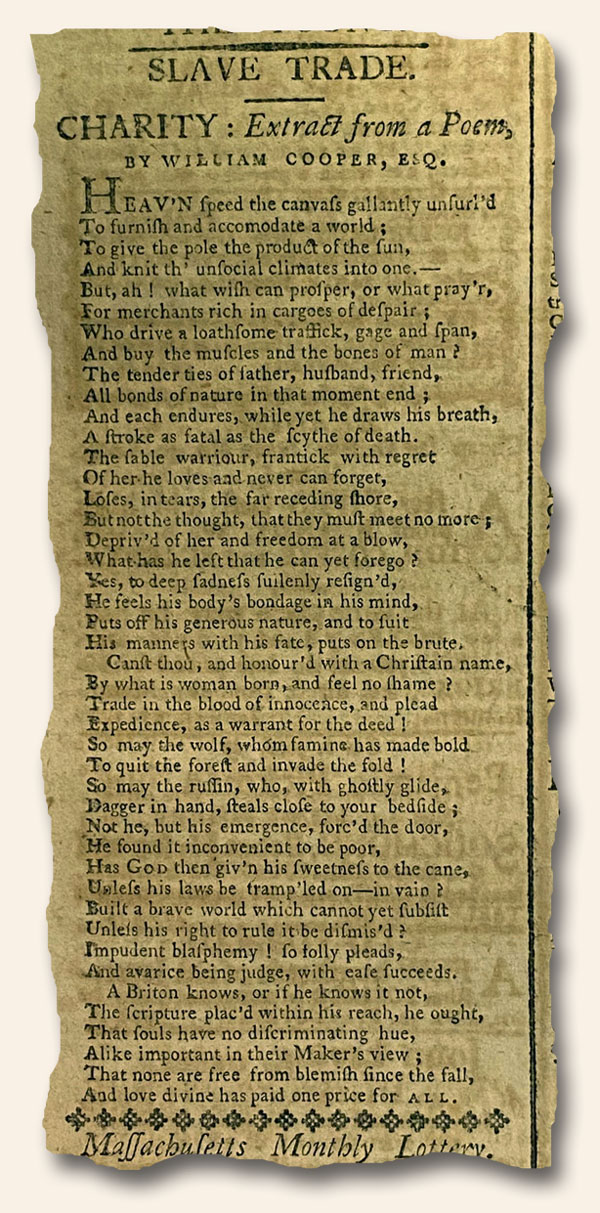
Snapshot 1807… William Cowper and the Slave Trade…
October 22, 2020 by GuyHeilenman · Leave a Comment
We recently discovered a Gazette Of The United States, For The Country (Philadelphia), dated May 25, 1807 which had a timely reprinting of William Cowper’s poem regarding the abolition of the Slave Trade – just a few weeks after the enactment of the Slave Trade Act of 1807 (United Kingdom). It would still be another quarter-century before slavery within the Britain Empire would be abolished. 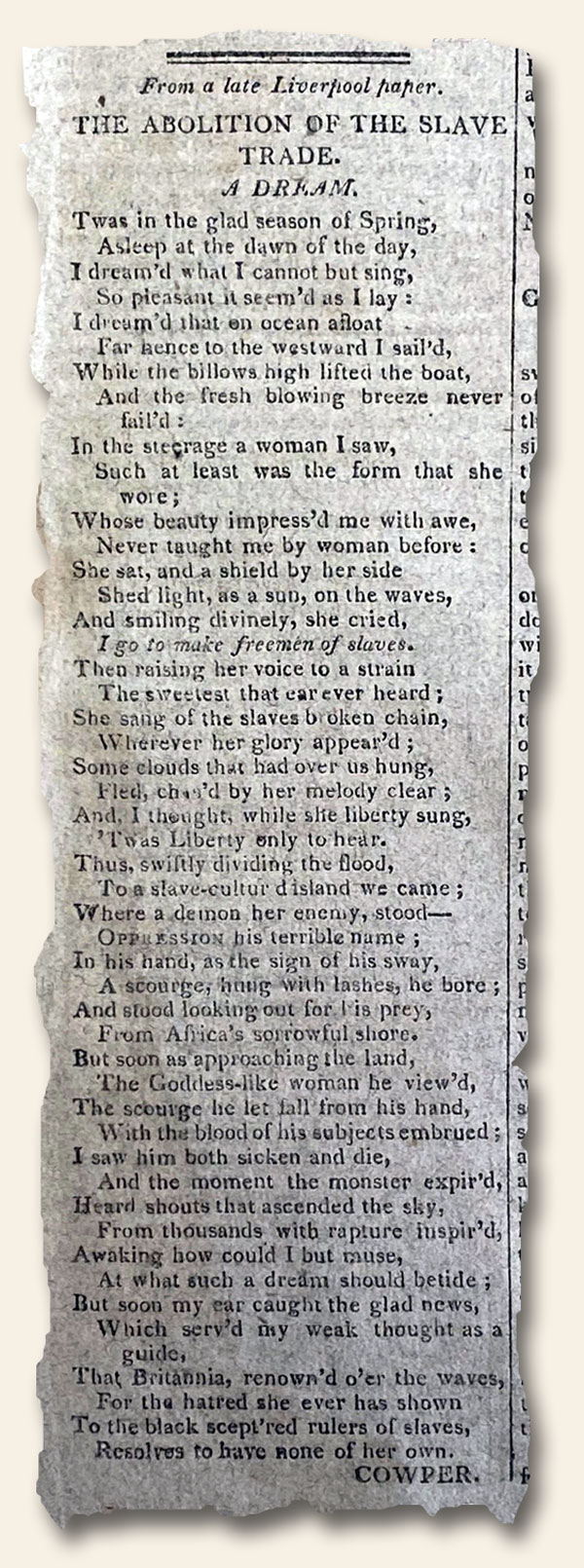
Christmas-themed poems from 1850 – Food for thought…
December 24, 2019 by GuyHeilenman · Leave a Comment
Earlier this year I came across a December 21, 1850 issue of Household Words – a publication “conducted” by Charles Dickens, which actually contained an original work by him titled “A CHRISTMAS TREE.” Although this was his publication, the majority of the contributions within were typically written by others. While perusing the issue I came across a set of Christmas-themed poems which stirred my heart. Hopefully you will also find them moving. Enjoy.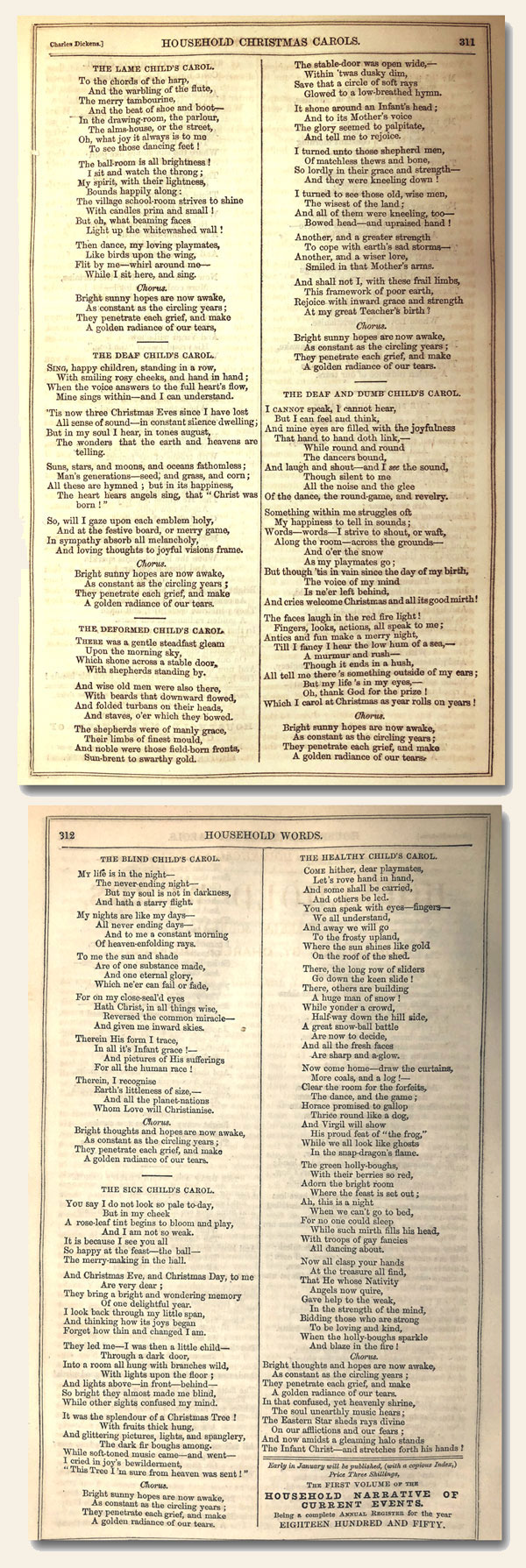
Snapshot 1934… Bonnie & Clyde – their destiny foretold…
November 18, 2019 by GuyHeilenman · Leave a Comment
In 1934 Bonnie penned what most believe to be her last poem: “The Story of Bonnie and Clyde”, which appeared in newspapers throughout the country shortly after their deaths. The uncanny foretelling of their fate would capture the imagination of many, and help transform them into legendary figures – a fantasy she had held since her teenage years. Although the poem appeared in quite a few newspapers, few can be found. However, we recently came across a Chicago Daily Tribune dated May 25, 1934 which printed the poem on the day of their funeral. Enjoy. 
“Life’s Poetry”… Food for thought…
May 16, 2019 by GuyHeilenman · Leave a Comment
As I was searching through our inventory of mid-1850’s Correctors (Sag Harbor) for an historic ad for “Douglass & Van Scoy – PHOTOGRAPHS and DAGUERREOTYPES” – pioneer American photographers, I came across the poem shown below which caused me to pause and smell the roses. Enjoy.




